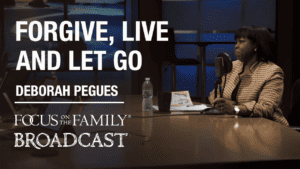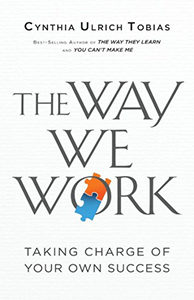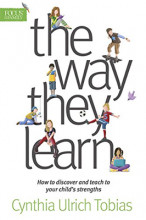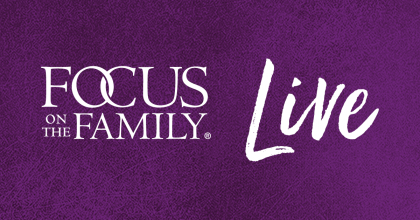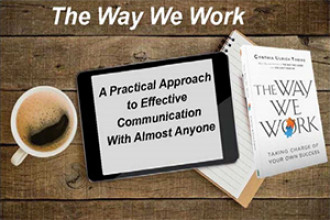Opening:
Excerpt:
Cynthia Tobias: “How many – how many of you know someone who is definitely not like you – you know they don’t think like you? Did you also know this? They don’t want to think like you.”
End of Excerpt
John Fuller: We’re learning to appreciate our different ‘thinking-and-learning styles’ on today’s Focus on the Family, and your host is Focus President Jim Daly, I’m John Fuller.
Jim Daly: John, I’m excited to share this very practical message from Cynthia Tobias today, because it’s got advice that can help improve communication in your marriage, and with your friends and co-workers. Cynthia gave this talk at a Focus chapel in July, and our co-workers were talking about it for days afterward. And that’s a typical indication that this may make a great broadcast.
John: It really is. You can kind of sense when somebody brings in this kind of message and it’s got some traction with the people that are in the audience.
Jim: Well, Cynthia Tobias is an author, speaker and educator – she’s probably best known for her ground-breaking book, published with Focus on the Family, called The Way They Learn. What we’ll hear today is from her latest book, The Way We Work.
John: Here’s Cynthia Tobias, speaking to Focus on the Family staff.
Body:
Cynthia: Several years ago, my husband and I would receive a monthly community newsletter from a large corporation in our area. I looked forward to it for only one reason. Every time it came out, on the front page, it had a little box, and it had a tip, a tip that somebody could use for something. Like, one month, it was ‘how to recover data lost on your hard drive.’ And then it would explain very briefly. And then at the bottom, it would have a statement that says, “If you want to know why this works, turn to Page 6.” My husband Jack, he never read the box. He automatically turned to Page 6. He doesn’t – he’s not interested in the short version. He wants to find out what the underlying things are. He wants to have the whole thing. You know, we learn very differently, Jack and I.
Did anybody else out here marry somebody opposite of you, almost completely opposite? Did you think it would be a refreshing perspective? (LAUGHTER) Have you noticed on a day-to-day basis, no matter how much you love that person, it’s not that refreshing? (LAUGHTER)
Primarily because we are living proof that our way works. Why would I want to do it your way if I already know my way works? God has made us incredibly complex and He had a design and purpose for us, obviously. But it takes us our whole lives some time to figure out even understanding ourselves, let alone understanding each other. There’ll be times even now where Jack will pull me aside and say, “Are there other people who understand you when you talk this way?” (chuckle) Sometimes I forget.
It’s, you know, what I discovered over the past 32 years, of course, I took my – the research that I did. And I found a few timeless truths when it comes to understanding yourself. And with that understanding, how we learn also determines how we communicate best, how we work best with each other. And it’s incredibly helpful. Awareness is half the battle. Just knowing the person isn’t irritating you on purpose goes a long way, whether you’re living with them or working with them. And this morning for the brief time that we’re together, I want to just share a sort of ‘page one’ version of what are the timeless puzzle pieces, the timeless truths that kind of – you know, we are puzzle pieces. We’re not boxes or categories. Haven’t you taken dozens of different inventories and different tests, and you’re supposed to come out the end and you say, “Oh, I’m this. Actually, I’m kind of this, too. This one’s kind of me sometimes. And I’ve been known to do – what am I?”
You will never fit into a category or a box or a label. You’re puzzle pieces. And you have every piece of the puzzle, by the way. This is the other thing we have discovered. Your pieces just aren’t the same size. So you can actually have two large pieces of your puzzle be identical in size but be opposite in characteristics. So you actually argue with yourself more than you argue with anyone else. Or you’re really one way at work and another way at home.
Well, there’s sort of a logical explanation for that. And I think that it helps to know about the border, the basic what we would call cognitive styles, how every mind remembers information, takes it in, what they do about it. And frankly, I was surprised by a lot of it. My background was in being a high school teacher in public schools. I was a police officer for six years, and I’ve been an author and speaker now for 14. I didn’t arrest the kids I taught, by the way, just so you know that.
(LAUGHTER)
But here’s the fun thing. There are some basics that regardless of what you do in life, regardless of your age, regardless of anything else, are just timelessly true in human nature. And we get them kind of in our DNA, some of those basics in our DNA. It’s not like – we’re hardwired, but it’s not like we can’t adapt and adjust. But God really knows what he’s doing when he puts us together in the first place.
For example, three big puzzle pieces when it comes to how you remember information. And again, my husband and I are opposite in this. But the three pieces – and I’m sure you’ve heard of these – auditory, learn by hearing, visual, learn by seeing, kinesthetic, learn by doing. That familiar to you? But there’s so much more to it than we were taught about it.
For instance, auditory means learn best by hearing, but not by hearing other people talk. If your auditory piece of the puzzle is big, you learn best and remember it by you talking. That’s why you get in trouble in school, not that you guys ever did. But you need to talk about it. The auditory person wants to discuss it, ask questions about it, just talk it through so that they know what they’re doing. My husband is the most auditory person I’ve ever met. I’m not personally that auditory. But Jack, you hear him all the time say things like, “Let me ask you a question. Oh, now we’re talking.” And he’s – “Listen, listen. I just want to – I want to say one thing.” Oh, boy. Early on in our relationship, I discovered that when we watch a movie together, it’s not the same for him as me. He’s auditory and needs to talk. We can’t actually go to a theater to watch it.
(LAUGHTER)
So on a DVD, we would start – ‘course, he has the remote – we would start. At about 10 minutes in, he would push pause. “Can I just tell you the one thing I – did you notice that blah, blah, blah.” All right, all right, all right. Play. Less than 10 minutes later, pause. “Did you see that? Did you know….” – I said, “Jack, I cannot watch this movie if you’re going to stop it every 10 minutes and talk.” He said, “Well, if I don’t get to talk during it, I’m not gonna remember what I wanted to say.” So we worked out this negotiation. This is our deal, and it still is all these years later. For every two-hour movie, Jack gets four pauses.
(LAUGHTER)
No questions asked, only grace given ‘cause I know he needs it, and I’m going to tolerate it. But you have to give and take. So at the end of four pauses, you’re done, no more pauses. Now, this has been good for me because I’ve learned to be patient and graceful. But it’s also been good for Jack. You know, he’ll get up and he’ll start to pause, and he’ll think, “Oh, I’ve only got one left.” And he’ll pull back.
(LAUGHTER)
It’s that auditory part, the auditory part that says – well, uh, and sometimes if you work with someone – we used to work in a very quiet office, but our bookkeeper who came in part-time, she would walk in. She’s the most auditory person. We’re in this peaceful office. No one’s talking. She comes in, and she goes, “Hey, how you doing? Oh, that’s great. Sorry I’m a little bit late. I just got a, you know, held up at this stoplight. I’m looking for the – where is that zip code book? And what” – “Diana, don’t say everything you think.” She doesn’t even know she’s talking. It’s not like she’s talking to you. She just needs to talk. But the auditory, if she can’t talk, it’s gonna actually stop her from remembering.
Now the second piece of the puzzle, which is for some of you, a little bit bigger than the auditory, is the visual, right? I’m highly visual and highly kinesthetic. But visually, it means a visual learner, we thought, well, that would be easy. You just give them colorful things to do, and you give them colorful folders and PowerPoints and handouts, and all the visuals will be happy. That’s true, and there’s a lot to that. But there’s more to being a visual learner than you thought. See, if you’re visual like me, our minds – when you start talking to us, we get a picture. It’s not always the right picture. It’s great picture, though.
(LAUGHTER)
So we pretty much stick with it. And we can be out in the cosmos. And if you could peer into our heads, you might be horrified at what you have – what we have pictured to go with what you thought you so clearly communicated. Every committee, every naming committee especially, needs a visual person on the committee. Because as a visual person, I look at signs in a different way, titles. In my very first book, The Way They Learn, I made a list of places I wouldn’t want to work based on having to tell people I worked there. And one of them was – there was a building in downtown Seattle for a long, long time – decades – that was a big, brown industrial building. And on the side it said ‘Buffalo Sanitary Wipers Company.’ What is that? You needed a visual person on your naming committee.
(LAUGHTER)
We lived down by the Port of Tacoma in the state of Washington. And when they did a lot of improvements, they had to put in – it was kind of a habitat, sort of a rain foresty thing to sort of balance out the ecosystem. And so it took them a long time to decide what to name it. And one day, Jack and I were driving by, and we saw that they’d finally put up the sign. It said Habitat of Circling Waters. I said, “A toilet?” (LAUGHTER) “They named the habitat after a toilet?” He said, “That’s not what they mean.” I said, “That’s what I picture.”
You know, down in the south, they have a lot of cemeteries versus graveyards. And I found – I love the South. I found out a graveyard is when it’s attached to a church, and a cemetery is when it isn’t. But they all have – seem to have one thing in common. The driveway that goes in always says at the front ‘no through traffic.’ (LAUGHTER) Well, duh. Why don’t they just call it what it is, a dead end? (LAUGHTER)
See, my visual brain, it just works like crazy. Now what happens if I’m a visual kid, and I’ve got an auditory mother, which I really did – they say it a thousand times. “I have told you over and over and over again.” But they don’t get it. Here’s why. Let’s say my auditory parent says, “Listen. Come here. I need you to go down to the kitchen and get that blue porcelain mug by the sink and put it out on the patio table.” I say, “OK.” I turn around, and as soon as I’ve turned around, I’ve already forgotten kind of what she just said. But I don’t want to turn around and ask her again because she’ll say, “Oh, for heaven’s sake, why don’t you listen to me? And why weren’t you paying attention?” And so I go down, and I just kind of try to do what I think maybe she said. And it doesn’t work out well. But what if she says this? “Listen; I need you go down to the kitchen and get that blue porcelain mug. You know, the blue mug that’s sitting beside the kitchen sink.” Pause. Pause. Pause. What am I doing? I’m thinking in my head. I’m going, “Oh, yeah, yeah.” I can picture the blue porcelain mug. “Great, and I need you to take it out to the patio and put it on that round white patio table.” Pause. Pause. What are the chances now that I’m gonna do exactly what you told me to? So much bigger, so much greater. Paint me a picture. Give me something to look at. And if you can’t give me something to look at, let me picture it.
Look into my eye to say, “Do you understand what I mean? It’s across from that Chevron station that used to be a Dairy Queen.” “Oh, yeah, the one that has the” – “Yes, that’s it” – the visual piece of my puzzle. I need a picture in order to remember.
Program Note:
John: Well we’re halfway through today’s message from Cynthia Tobias on Focus on the Family and Jim, I’m wondering, as I listen, what kind of learning style do you have?
Jim: John, I’m definitely an auditory learner, and Cynthia is right on the money! I really do need to talk things through to remember them….and make my lists I guess kind of verbally. I guess that’s why I enjoy interviewing people and drawing out their stories – it’s what I’ve always done!
John: Hmm..talk, (LAUGHTER) and listen, you listen well.
Jim: Thank you.
John: I think I have an ailment of that auditory learner, but I do make lists, as you know. As we’re, working here in the studio, I make a lot of lists. So perhaps I’m a mix of those things. Well I really appreciate what Cynthia is saying. We all have typically a combination of strengths. And this is useful information, and you can find even more in Cynthia’s book, The Way We Work. We have that, of course, at our website or you can call. Donate today make a gift of any amount the Family either a one-time pledge OR a one-time gift, and we’ll send a copy of The Way We Work to you as our thank you gift. Our number is 800 the letter A and the word FAMILY. That’s 800-232-6459, or donate and request the book at focusonthefamily.com/broadcast.
Let’s return now to Cynthia Tobias on Focus on the Family.
End of Program Note
Cynthia: Now the kinesthetic part of the puzzle, this is a fun one because kinesthetic, we thought, well, that’s just kids who need to learn by doing, hands-on manipulative things and people who, oh, no, kinesthetic has a much more inconvenient meaning. (LAUGHTER)
Kinesthetic means born to move, born to move. And if you’re a highly kinesthetic piece of the puzzle, it’s hard for you to stop moving, ever. I mean, you can look like you’re not moving, but some part of you is moving. You shift. You – you can’t help it because you wanna stay on the move.
You tend to work in short spurts, and you wanna try things out because you wanna keep things moving. So often, we’ll say, “So in other words, what? Well, great, let’s go. Let’s try it.” “I haven’t even told you the rest of the instructions yet.” “I know, but can’t you tell me as we go, and we can kinda – ‘cause I wanna figure it out as I go. Here. Let me just try it, and you guide me as I go.” This drives the auditory person crazy ‘cause they need to tell you all the instructions…
And they need to have you listen. This is what I discovered about Jack. Not only does he need to talk, he needs me to sit still – which I have a difficult time doing – and listen, looking at him. All I’m thinking about then if I can’t move is what? Moving.
When can I escape? How long will this take? If he would just walk with me and talk, or drive with me and talk, I would do much better ‘cause as long as I’m moving, I’m actually pretty happy. But I’m not gonna remember it if you made me sit still and quietly listen and not move.
It’s one of the reasons we have a lot of times refreshments at the meetings, right? Refreshments not only because it makes it a relaxed, informal atmosphere, but it gives a kinesthetic person the chance to do something – uncork the bottle, get up and get seconds. I mean, you have a – an excuse to walk while you’re still listening. But the auditories don’t think that you’re listening. They are suspicious that you’re not listening.
(LAUGHTER) “You’re not looking at me. You’re not sitting still. You are not worshipping at my feet.” (LAUGHTER)
(Laughter) No, I’m just giving you auditories a hard time. It’s true, isn’t it? How do you know someone’s listening to you? How do you know the visual person’s gonna remember? Well, the kinesthetic seems to be a real challenge. And even 20 years ago, 40% of the population was pretty high in that piece of the puzzle, which means we don’t like long meetings.
We don’t like long staff meetings. We don’t like long anything. We like working in short spurts, where we can get up. We can move around. If all we do is just shift, we’re happy with that. We just wanna keep moving.
The other thing that’s real challenging about the kinesthetic person is we don’t actually take your word for a lot of things. Not that we don’t trust you, it’s just that we’d like to try it ourselves. We taste – “Oh, this tastes terrible.” “Really? Let me taste.” (LAUGHTER) “I just told you it tastes terrible.” “I know. But how do I know?”
(LAUGHTER) The vending machine says out of order. But is it really? (LAUGHTER) I mean, what have they tried so far? And I might actually be able to do it a certain way where I could get everybody’s pop that didn’t stick with it, and they gave up too soon.
The kinesthetic kid, we run – we’re the ones that run our hands down the wall, try and explore and touch and feel and – “Oh, gum.” “Stop that. Don’t…” (LAUGHTER)
It’s not that we’re trying to get in trouble. We just have to know. We like field trips. I – my dad was a Nazarene pastor, and we grew up – I grew up in Las Vegas, right? I got a lot of spiritual field trips. I could see up close and personally what was going on, and I didn’t have to read about it or be lectured about it. I could see it. Some kinesthetics – you see a door that says, “Danger – do not go beyond this point.” I just need to see what the danger is. (LAUGHTER) Doesn’t – doesn’t mean I’m actually gonna go beyond it. But maybe. (LAUGHTER)
How many of you know someone who is definitely not like you – you know they don’t think like you? Did you also know this? They don’t want to think like you. This was a discovery I made there. “That’s not fair. Why don’t they wanna think like me?” Well, because God made you – each of us not only unique and individual, but he also gave us this capacity to understand and to recognize what somebody else needs.
Note, for example – and one of the things I really like, uh, one of the biggest and most important research areas has to do with not just remembering information, but the whole cognitive process of having the information come in and how you process it to understand it, and then how you make decisions about it. And one of the greatest researchers was Herman Witkin. He was a psychological researcher during World War II. And the United States Navy hired him to come and work with their top gun pilots. He discovered, Witkin discovered in his research that the whole world population – and he did it around the world, not just in the United States – the whole world population seems to be pre-wired one of two ways, in general. Now, everybody has differences within it, but in general, wired two different ways, 50/50.
Fifty percent of the world seems to be wired in their mind when the information comes in to be more what we would call analytic. Automatically, the analytic brain looks around. It begins to break things down, look for details, look for specifics step by step, piece by piece, beginning, middle, end – 50%. The other 50%, not as analytic, but the research shows unswervingly just as intelligent, just as smart, just as capable. But instead of being more analytic, we are what they consider, like, more global – big-picture, context-oriented. I want the whole picture. I don’t wanna just go step by step by step.
Now, we found out that there’s a big difference between the analytic brain and the global brain. Let’s just talk about a few of the differences. If you are wired analytically, [THROAT CLEAR] the chances are good that you’re a detail – more detail-oriented person. You like the detail.
In fact, one of the strengths of the analytic is focusing on details. But – but the strength of the global is seeing the overall picture. And you need both. It’s like the right and left hand. If you don’t have one of each in a working team, you’re in trouble because it comes out kinda one-sided.
I can remember even as a police officer, my highly analytic partner, Luke. Come on the scene of the crime, we’d walk in. He’d immediately start cataloguing everything and going down. And I’d be saying, “Wait. Wait. Wait. Wait. Wait. [THROAT CLEAR] I think there’s more to this.” “No, we have to…” I’d say, “Hold on. Hold on.” “Well, how do you know? What are you talking about?” “I don’t know yet, but I’ll know in a minute maybe.” Huh. If I can’t say it, if I can’t articulate it, he’s too frustrated to go on with it. We need each other, though, because we both bring different strengths to the table. Details, big picture – we need both.
Look at the strength of analytics as doing one thing at a time. Do one thing. Do it well. Finish it. Start the next. That’s great. I – in many ways, I wish I had that strength. [THROAT CLEAR] I don’t. As a more global person, I like to have everything spread out at once and just have it all out there. And then I – I work – as globals, we work by great spurts of inspiration followed by long plateaus of nothingness. (LAUGHTER)
This is why if I have to do one thing at a time, and I lose interest or inspiration, I’m stuck. But if I’ve already started three or four other projects, I just switch to them. This drives our analytic counterparts crazy. No. 1, our desk’s a mess. I don’t file anything. Everything’s in – I go by stacks and piles. And my analytic husband files everything. Not me because if I file it, I don’t remember what I called it.
I already – in my computer, when I – in my Word documents, I don’t remember what I called it. I – I can’t tell you how often I use the search to try to find the word in the documents. And Jack said, “You know, you just need to put it here and then have a sub file and have a sub file.” I said, “I would never find it again.”
(LAUGHTER)
Plus, ‘out of sight, out of mind.’ So he puts up to a great extent with what he considers to be chaos but what I consider to be kind of important to be able to switch back and forth.
The analytic, for the most part, they like working independently. They even choose independent sports – golf and swimming and tennis – because they don’t really like the idea that the whole team depends on – in some ways, one person, could ruin it for everybody. They don’t like that. In college, they didn’t like study groups because they figured it’s some global person sucking the information out of the people who actually did the work.
(LAUGHTER)
None of this all-for-one, one-for-all thing. “I don’t wanna have my A grade depend on whether or not you slack off.” That’s what makes teamwork kind of interesting – doesn’t it? – kind of challenging.
Well, the globals, we like working with others. In fact, we thrive on it. Collaborating, bouncing off inspiration and ideas from another person, it’s kind of what we’re really good at. So again, it’s good for one of each, right? I know my husband and I, even though we’re frustrated with each other sometimes, we do appreciate that teamwork aspect because I honestly just don’t see things from his point of view.
Closing:
John: Well she sounds so calm as she describes how she and her husband see things differently. Cynthia Tobias has been our guest on Focus on the Family, and we’ll hear more about how our learning styles affect our relationships, next time.
Jim: This really has been fascinating, and I’m sure many of you are thinking about your spouse, or a co-worker, who is the opposite of you when you consider who’s global and who’s analytic. And if you think about it — you make a great team! When you are thinking together. That is the hard part. You’ve got one person who is looking at the big picture, and another who is checking all the details! And sometimes it’s hard for us to appreciate the differences, especially in our spouse. Those opposite styles seem to become irritations so quickly.
John: And Jim, as you’re talking I’m thinking, ok, you’re a global thinker, I tend to be a global thinker – and ironically, we’ve each got spouses who are quite analytic, and quite thoughtful and detailed oriented. And when you think of combining those two traits it really makes a lot of sense that you are stronger together.
Jim: Yeah, we’re the ones who come home from work and say, “Hey, let’s go for a hike!” and our wives might say, “Do you know the list I’ve got to complete over the next few minutes?” or you know “The homework we’ve got to cover?” ….it’s that priority first!”
John: Yeah, we’ve been there, done that! And in Cynthia’s case, SHE’S the global and her husband Jack is analytical, so this isn’t based on gender…. It’s, really a hard wiring of the personality.
Jim: That’s right. And, of course, these differences really can cause conflict, if we don’t understand them. Just like we have heard today. Let me just remind you — if you need some help understanding your spouse, and would like to talk to a counselor, give us a call. One of our highly trained, Christian counselors will give you a call back and talk things through with you, and if needed, refer you to a like-minded Christian counselor in your area.
And if you feel like your marriage is in crisis, at that point where you need a lot more help, we’d highly recommend our Hope Restored marriage intensive program. We help couples get to the root of their issues, to not only avoid divorce, but to have a thriving marriage. And over 80-percent of those that attend say they’re doing really great, and their still married two years later. God is doing wonderful things through Hope Restored!
And if you’re a financial partner of Focus on the Family, let me say thank you for helping us save these marriages and doing so much more! Our research shows that we’ve helped 11-thousand couples per month resolve a major marital crisis – that’s an amazing statistic! So please, I hope that’s enough evidence to encourage you to join us with a regular, monthly pledge if you can – that’s the best way to help. And when you make a pledge of any amount, we’ll send you Cynthia Tobias’ book, The Way We Work, as our way of saying thank you for being there for others. And if you can’t make that monthly commitment, a one-time gift would also help so many. We just want to get this book into your hands!
John: And the fastest way to do that is to make a phone call our number is 800-A-FAMILY. 800-232-6459 or you can donate online and request The Way We Work at focusonthefamily.com/broadcast
So, if you enjoyed today’s program, please, tell a friend to join along, to listen in next time, when Cynthia will share mores about what it’s like to be a ‘global’ thinker….
Teaser:
Cynthia: I’ve been known, and I’m more extreme than some globals maybe, but I’ve been known to start a good mystery novel and then skip to the last chapter to make sure I’m gonna like how it ends. (LAUGHTER) If I do, I’ll go back and read the rest. But I don’t wanna read a whole book and get to the last chapter and hate it.
End of Teaser
